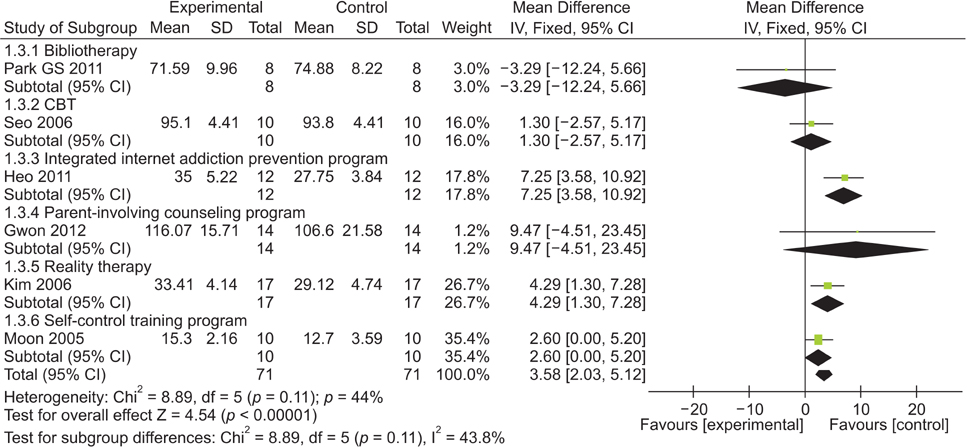Healthc Inform Res.
2016 Jul;22(3):217-230. 10.4258/hir.2016.22.3.217.
Effects of Psychosocial Interventions for School-aged Children's Internet Addiction, Self-control and Self-esteem: Meta-Analysis
- Affiliations
-
- 1Department of Nursing, Kangwon National University, Samcheok, Korea.
- 2Department of Nursing, Sahmyook University, Seoul, Korea. fountain@syu.ac.kr
- KMID: 2357400
- DOI: http://doi.org/10.4258/hir.2016.22.3.217
Abstract
OBJECTIVES
This study was conducted to perform an effect size analysis of psychosocial interventions for internet addiction and to identify the intervention moderators applied to school-aged children.
METHODS
For the meta-analysis, studies were included that were published in English or Korean until January 2015, without limitation in terms of the year. They were retrieved from 11 electronic databases and by manual searches according to predefined inclusion criteria.
RESULTS
A total of 37 studies were selected, which included 11 treatment conditions and covered a total of 1,490 participants. The effect size estimates showed that psychosocial interventions had a large effect for reducing internet addiction (standardized mean difference [SMD], -1.19; 95% confidence interval [CI], -1.52 to -0.87) and improving self-control (SMD, 0.29; 95% CI, 0.11 to 0.47) and self-esteem (mean difference, 3.58; 95% CI, 2.03 to 5.12). The moderator analyses reveals that group treatments, a selective approach, a long duration, a community setting, or higher school grade had a larger effect.
CONCLUSIONS
The findings of this review suggest that psychosocial intervention may be used to prevent Internet addiction in school-aged children, although further research should be conducted using a randomized controlled trial design or diverse age groups to provide evidence-based recommendations.
Keyword
Figure
Reference
-
1. Li Y, Zhang X, Lu F, Zhang Q, Wang Y. Internet addiction among elementary and middle school students in China: a nationally representative sample study. Cyberpsychol Behav Soc Netw. 2014; 17(2):111–116.
Article2. Li W, O'Brien JE, Snyder SM, Howard MO. Characteristics of internet addiction/pathological internet use in U.S. university students: a qualitative-method investigation. PLoS One. 2015; 10(2):e0117372.
Article3. Korea Internet & Security Agency. Annual report of the 2013 Korea Internet White Paper. Seoul: Korea Internet & Security Agency;2013.4. Cha ES, Kim TH. Effects of the group music therapy on behavior, self-control, social interaction and stress for the internet-addicted students in elementary school. J Korea Inst Youth Facil Environ. 2013; 11(1):79–91.5. Joo AR. Correlations among internet games addiction, self-esteem and physical health in middle school students. J Korean Acad Community Health Nurs. 2007; 18(2):331–339.6. Lee IS. Internet addiction, internet expectancy, and self-efficacy in elementary school students. J Korean Acad Child Health Nurs. 2003; 9(4):376–383.7. Chung HS, Park K. A review of primary school student with internet addiction. J Psychother. 2009; 9(1):27–45.8. Ozturk C, Bektas M, Ayar D, Ozguven Oztornaci B, Yagci D. Association of personality traits and risk of internet addiction in adolescents. Asian Nurs Res (Korean Soc Nurs Sci). 2015; 9(2):120–124.
Article9. Korea Internet & Security Agency. Annual report of the 2013 Internet Addiction Status Survey. Seoul: Korea Internet & Security Agency;2014.10. Winkler A, Dorsing B, Rief W, Shen Y, Glombiewski JA. Treatment of internet addiction: a meta-analysis. Clin Psychol Rev. 2013; 33:317–329.
Article11. Park SM. A meta-analysis on the effects of adolescent internet addiction group counseling program in Korea. Korean J Couns Psychother. 2009; 21(3):607–623.12. Oh IS, Kim C. Meta-analysis on the effects of the prevention and intervention programs for internet addiction. J Korean Inf Educ. 2009; 13(4):529–537.13. Ruddy R, House A. Psychosocial interventions for conversion disorder. Cochrane Database Syst Rev. 2005; (4):CD005331.
Article14. Kim SY, Park JE, Lee YJ, Seo HJ, Sheen SS, Hahn S, et al. Testing a tool for assessing the risk of bias for nonrandomized studies showed moderate reliability and promising validity. J Clin Epidemiol. 2013; 66(4):408–414.
Article15. Cohen J. Statistical power analysis for the behavioral sciences. 2nd ed. Hillsdale (NJ): Lawrence Erlbaum Associates;1988.16. Orwin RG. A fail-safe N for effect size in meta-analysis. J Educ Stat. 1983; 8(2):157–159.
Article17. Pyo MH, Lee YM. The effects of game control program on the mitigation of internet game addiction and self-efficacy. Korean J Elementary Couns. 2004; 3(1):105–118.18. Yu F, Albers J, Gao T, Wang M, Bilberg A, Stenager E. A smartphone application of alcohol resilience treatment for behavioral self-control training. Conf Proc IEEE Eng Med Biol Soc. 2012; 2012:1976–1979.19. Forsman AK, Nordmyr J, Wahlbeck K. Psychosocial interventions for the promotion of mental health and the prevention of depression among older adults. Health Promot Int. 2011; 26:Suppl 1. i85–i107.
Article20. Park BK, Lee E. Effects of my child's safety web-based program for caregivers of children with cancer in South Korea. Healthc Inform Res. 2014; 20(3):199–208.
Article21. Song SM, Park SM. Study on the development of intervention programs for internet addiction types. Seoul: Korea Youth Counseling & Welfare Institute;2008.22. Mason WA, Spoth RL. Sequence of alcohol involvement from early onset to young adult alcohol abuse: differential predictors and moderation by family-focused preventive intervention. Addiction. 2012; 107(12):2137–2148.
Article23. Horowitz JL, Garber J. The prevention of depressive symptoms in children and adolescents: a meta-analytic review. J Consult Clin Psychol. 2006; 74(3):401–415.
Article24. Fisher GL, Harrison TC. Substance abuse: information for school counselors, social workers, therapists, and counselors. Boston (MA): Allyn & Bacon;1996.25. King DL, Delfabbro PH, Griffiths MD, Gradisar M. Assessing clinical trials of Internet addiction treatment: a systematic review and CONSORT evaluation. Clin Psychol Rev. 2011; 31(7):1110–1116.
Article26. Hofmann SG, Smits JA. Pitfalls of meta-analyses. J Nerv Ment Dis. 2008; 196(9):716–717.
Article
- Full Text Links
- Actions
-
Cited
- CITED
-
- Close
- Share
- Similar articles
-
- The Influence of Parental Self-Esteem on Late School-Aged Children’s Media Device Addiction: The Mediating Effect of Marital Conflict and Children’s Self-Esteem
- Internet Addiction, Self-esteem, and Loneliness in Adolescents
- Effects of an Integrated Internet Addiction Prevention Program on Elementary Students' Self-regulation and Internet Addiction
- Personal and Environmental Predictors of Internet Addiction in Higher Grade Elementary School Students
- Scope of Internet Addiction and Predictors of Addiction in Korean Children in Early Elementary School





